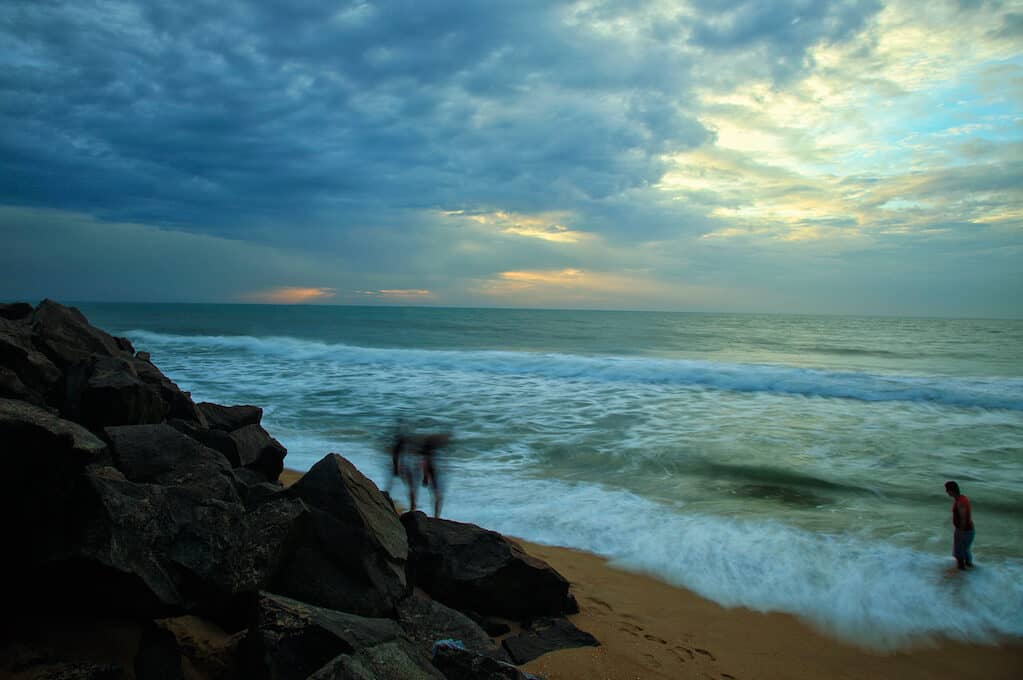Up in the air, with hoots and wild calls he flies, chaddi showing, dupatta wildly fluttering.
“Anna, wait for meeee” screams the other, down, large black dupatta, larger than him, larger than life fluttering in the winds of Neelam. “Wait for me,” and the black dupatta, larger than him, larger than life is off the ground, into the air, and away.
And with a whoop, they are gone.
Neelam, so pretty, so beautifully devastating, like its name, roars into the night, hungry, tired and filled with crow feathers, ship rust, and empty souls.
***
The two were seen by Baalu, at the tea stall.
First.
First and foremost, like A for Apple, then followed by B for Ball.
The taller one asks, “When will Neelam come?”
The Nee is stretched and the L is lolling on his white tongue, between the 20-something teeth, like a girl on a swing.
Neeellllam. N for Neeelllam.
“Neelam? I don’t know.”
He knows he needs to go home. He knows he needs to close his tea stall soon. He knows when the wind howls louder than the voice on his radio then the pretty waves in the sea shall jump higher than any mango tree he has seen.
Kid number two, or the smaller kid with lesser teeth and a rounder face asks, “Who knows?” Baalu has spilled the frothing tea-milk on his hand. Frothy like the sea today. Pretty, white, and dangerous.
Go ask Murugan, he says.
Then immediately, he says, “No. No, go home. Where you from? It isn’t safe.”
But the boys are gone, in the wind, in the dust with black dupattas catching up behind them.
Murugan is the second to see them, tugging the boat in and covering it with a bright plastic sheet.
“Why, child? Why do you want to know? She’ll come when she is ready. But you go home now.”
The fish in his bucket stare at them. Their eyes globelike, jaundiced, shining brighter than the sun last summer. His hands are hairy and through his vest you can see dark, bountiful hair peeking.
“Go home,” he says again, waving the bucket of fish with his hairy hands. “It’s not safe. She is screaming again.”
The third to see them was Munniyandi, running home with a thin plastic bag covering his head. He is skinny and frail and the thin shirt is drenched and hugging his torso, which happens even on hot, summer days (“like a spandex chaddi in WWE,” one of his smarter students would whisper conspiratorially to a friend one day).
“Why?” Munniyandi asks.
He is a teacher at the school. He hasn’t seen these ones.
But how is he to know? They come and go, in this town with the booming factory nearby. Vatsalakka would claim that it was the factory that brought Neelam to town. It was the bad karma, going round and round, like the stone grinder filled with rice, pulse, and water that made her change her mind and head this way. No one would believe her. But the factory would be closed a couple of years later after the country finally pays heed to the enormous corruption charges leveled against the top boss.
“Go home,” Munniyandi shouts into the wind, and now rain, in his most teacherly voice. “Go home now,” he says when the kids run ahead. But they are lost, in the rain, the fog, and so is his voice, picked up by the wind and tossed into Neelam’s mighty bosom.
Kutti Lakshmi was the last to see them. She was bringing the donkey home, to tie the frightened, braying animal in the shed. The girl had almost given up – the animal was too big and too stubborn for her. Mostly, it was too frightened.
“Why?” she asks unsuspiciously.
“Don’t you know?” says the smaller one. “We want to climb her and go to where she dies. It’s where all the superheroes are.”
Kutti Lakshmi hasn’t heard of superheroes or of dying storms. Her grandmother has never said such a thing. She is sure that if they do exist her grandmother would have told her at some point in her 9.23 years of existence. Still, she does know one thing, and that is when Neelam will cross the sea into the land. This her grandmother has told her, and so has the strange man on the radio. Not to look utterly stupid, she says in her boldest voice, “Okay then, you be ready at around 5.15. Wait by the sea, where the coconut trees are bent and where the sea foams angrily by the rocks.”
Neelam came and she went. She huffed and she puffed but she blew only a few houses down. The strange little boys with the strange little costumes weren’t seen again. “Must have gone home,” someone said. “There is no one searching for them.”
–
Varun Warrier is a student at the University of Cambridge. He enjoys reading, writing and telling stories. His works have been published in Pyrta Journal, Fiction365, ChaiKadai Benches, and Bricolage Magazine.
Lead image: “The day after “NILAM” cyclone…” (via Flickr user Vinoth Chandar)

